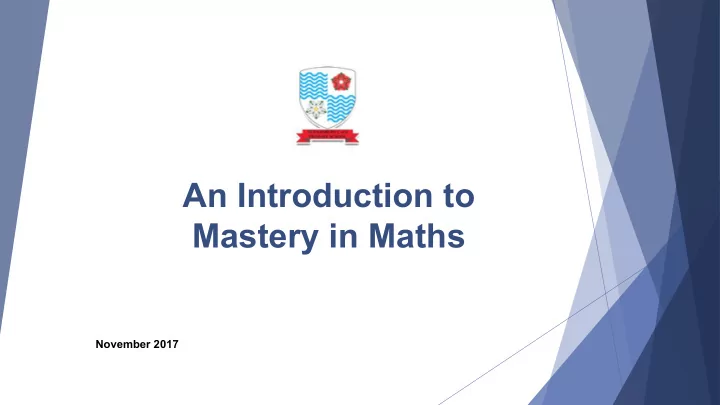

An Introduction to Mastery in Maths November 2017
Think of a Number 1) Double it 2) Add 10 3) Halve it 4) Subtract your original number 5) Discuss
Your Answer 5
The National Curriculum A significant change! The expectation of the National Curriculum is that the majority of pupils will move through the programmes of study at broadly the same pace .
Aims The national curriculum for mathematics aims to ensure that all pupils: become fluent in the fundamentals of mathematics, including through varied and • frequent practice with increasingly complex problems over time, so that pupils develop conceptual understanding and the ability to recall and apply knowledge rapidly and accurately. reason mathematically by following a line of enquiry, conjecturing relationships and • generalisations, and developing an argument, justification or proof using mathematical language • can solve problems by applying their mathematics to a variety of routine and non- routine problems with increasing sophistication, including breaking down problems into a series of simpler steps and persevering in seeking solutions. http://www.tewkesbury-primary.co.uk/parent-information/ school-curriculum-information/maths/
Growth Mindset The latest research of expert educational thinkers (Jo Boaler and Carol Dweck) shows that this approach is crucial to enable success for all children in maths. Jo Boaler’s research has uncovered and highlighted several key areas: Everyone can learn maths to the highest levels • Mistakes are valuable • Questions are really important • Maths is about creativity and making sense • Maths is about connections and communicating •
Key Messages “In a growth mindset, people believe that their most basic abilities can be developed through dedication and hard work. Brains and talent are just the starting point.” The power of yet – I cannot do it…YET • Power of praise – praising the effort, not the outcome • Talking about Maths and asking questions • Mistakes are valuable – they cause the brain to grow • Parents’ beliefs about Maths change their children’s achievement • Depth is more important than speed – understanding is crucial • Further information can be found at www.youcubed.org and www.tewkesbury-primary.co.uk/parent-information/school-curriculum- information/maths/
The Principles of Mastery • Reflects the principles of the 2014 National Curriculum • Based on the Singapore method of teaching, which has been developed and altered by experts to fit the UK education culture • Time given to think deeply about mathematical concepts and gain a real understanding, rather than a reliance on rote learning methods 3 divided by 15? Just add a zero! You can’t do that! • Builds self-confidence in learners • Whole class moved through content at the same pace • Children are challenged through depth and problem solving • Promote number sense • Children are taught that there is more than one way to solve a problem
5000 – 2179? Think about ways to find the difference between: 5000 – 2179.
Mastery in the Classroom • A focus on the use of concrete and pictorial resources throughout every year group
Mastery in the Classroom • Lessons are slightly shorter and focus on practical tasks, guided practice and then independent practice for the majority of children • Practice is intelligent; children complete fewer questions but have a wider range of opportunities to demonstrate the depth of understanding
Intelligent practice?
Intelligent practice! [1] 1 [2] 1 10 × 378 = 251 × 10 = 100 100 [3] 1 [4] 10 100 × 975 = 628 × 1 = 10 100
Mastery in the Classroom • The teacher does further intervention work with children who need more support to grasp the concept
Rapid graspers are challenged to “Solve it” and “Deepen it” Rounded to nearest 10 694 ? 654 700 Rounded to nearest 100 ? 1,300
Mastery in the Classroom • Children are seated with their "Learning Partner"
A Maths lesson at Tewkesbury C of E Step 1: Start with a problem – how would you solve it? Step 2: Discuss the problem with your learning partner. Step 3: Whole class discussion of methods and solutions. Step 4: Introduce Key Learning Point – whole class teaching. Step 5: Guided Practice. Step 6: Independent Practice and Teacher-Led Intervention. Step 7: Deepen It!
Mastery at Home Growth Mindset • Home Learning • DoodleMaths – including the new Doodle Tables app! • Fluency – number bonds, times tables, addition and • subtraction facts etc. Maths in the real world • YesUCan!
Recommend
More recommend